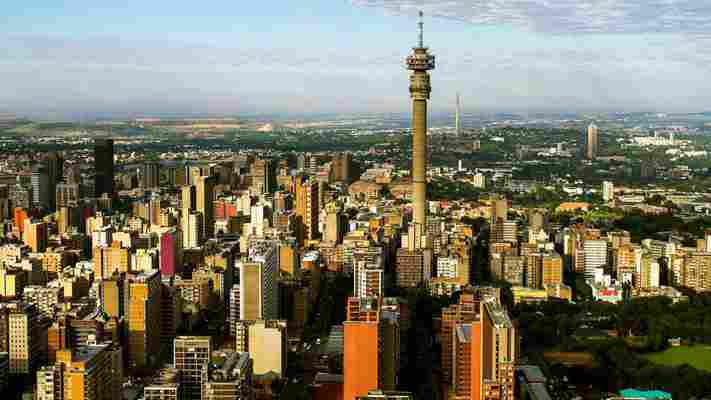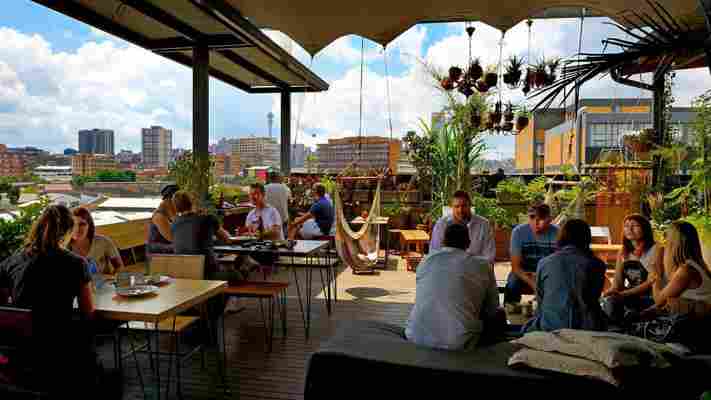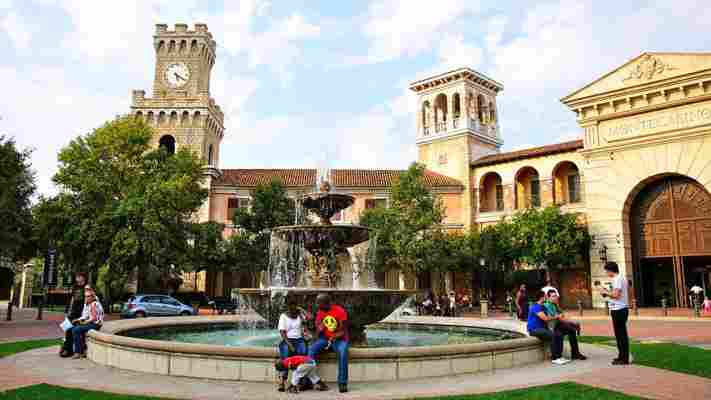Article continues below
Bursting with the energy and pace of a big city but with the friendliness of a much smaller town, Johannesburg attracts expats looking to accomplish a lot and integrate quickly.
“The thing I love most about Joburg is that it is a city of opportunity,” said Crystal Espin, originally from Cape Town and founder of local blog Joburg’s Darling . “You get the feeling that everyone is here to make something of themselves.”
The thing I love most about Joburg is that it is a city of opportunity.
Gerrard Hattfield, originally from Cape Town and founder of travel site Flight Factory , agrees, calling the city ‘The Silicon Valley of South Africa’. He explained that “compared to Cape Town, which is more laid back, Joburg is extremely hard working.”
South Africa’s largest city has significantly invested in the growth of small businesses, with the creation of the Ministry of Small Business Development in 2014. The city also recently hosted The Global Entrepreneurship Congress , which brought together entrepreneurs, investors and researchers from 165 countries to discuss start-up strategies and policy ideas. Other large and growing industries in the city include financial services, mining, telecommunications and biomedical research.

Johannesburg has the energy of a big city but the friendliness of a small town (Credit: Bloomberg/Getty)
Though industrious residents are often rushing to get to work or their next meeting, when they do slow down they’re known to be extremely friendly.
“It is very easy to start a conversation with strangers in Johannesburg, and this can lead to all sorts of interesting opportunities,” said Jean Bernard, originally from Cape Town, where he says it is much more difficult for newcomers to break into society.
It is very easy to start a conversation with strangers in Johannesburg, and this can lead to all sorts of interesting opportunities.
A strong ‘going-out’ culture makes it easy to mingle after work and on the weekends. “Around 8pm, most people have stopped working and the bars and restaurants start filling up,” Hattfield said. Since the perpetually sunny weather means the outdoor spaces fill up fastest, he suggests The Living Room , a popular rooftop bar in the city, for cocktails.
Despite the city’s always-on energy, residents remain welcoming to all. “I still remember the day we moved in; about 30 minutes later we got a knock on our door and the neighbours introduced themselves and welcomed us,” Hattfield said. “After five years here, we have experienced that most of the residents in Johannesburg always have a smile on their face.”

Hattfield suggests The Living Room rooftop bar for cocktails (Credit: Hemis/Alamy)
Where do you want to live? Many expats land in the Fourways, 30km north of the city centre. “The estate has top-notch security, and everything we need – shops, schools, transport – are all fairly close,” Hattfield said. Nearby Lonetree, also 30km north of the city, has a good community feel too, with young professionals and families spending weekends and afternoons walking their dogs, running, cycling and spending time in the park.
“Everyone works together to keep the beautiful parks looking great and the streets safe for residents to enjoy,” Espin said.

Johannesburg’s Fourways district is popular among expats (Credit: Greg Balfour Evans/Alamy)
Midlands, 40km northeast of the city, is slightly more removed, but a good option for expats looking to escape the city hustle. Those looking for proximity to restaurants and the city should consider Parkhurst and Parktown North, both 10km north of the city, both of which have plentiful cafes and boutiques.
Where can you travel? With the sunny weather, residents often spent their weekends outside, swimming in their pools or enjoying a braai (barbeque) with friends. Nearby Soweto, the township 25km west of Johannesburg, has a number of outdoor activities, like biking and off-roading, and cultural spots, like Mandela House , the former residence of Nelson Mandela that is now a museum highlighting his role in the anti-apartheid struggle. Hattfield recommends Soweto’s Orlando Towers Bungee jump , a 100m leap from the top of the two colourfully painted cooling towers of an old coal power station.
Pretoria, the country’s capital, just 60km to the north, is well known for its purple-blue jacaranda trees that line the wide avenues and parks. The city also is home a number of public artworks and to the Pretoria Art Museum with its a large collection of South African art.
Pretoria is well known for its purple-blue jacaranda trees (Credit: imageBROKER/Alamy)
A two-hour flight away, Cape Town, the country’s second largest city, offers a change of pace with a more laid-back atmosphere, plenty of hiking opportunities (including the famous Table Mountain) and nearby wineries that can be accessed via bike tours that depart daily from the city.
Gaborone, the capital of Botswana, is just an hour flight away, and is home to the Gaborone Game Reserve, a wildlife park that houses birds, zebra, hippos and various antelope. The famous Victoria Falls is also a 90-minute flight, and can be a jumping off point for safari tours.
Is it affordable? Compared to Western cities, Johannesburg is especially affordable for skilled workers and expats. Housing is 70% cheaper and food is 60% cheaper when compared to similar expenses in New York City, according to price comparison site Expatistan.com .
Bernard: “It is very easy to enjoy a very good life” [in Johannesburg] (Credit: Michelle Dormer/Getty)
Most recently, the city ranked at 116 out of 133 cities worldwide by the Economist Intelligence Unit ’s annual cost of living survey, which measures prices across both products and services in cities
“We have a significant skill shortage so if you have skills then it is very easy to enjoy a very good life, which can include a live in domestic helper or the ability to employ a gardener or a garden service,” Bernard said.
Join over three million BBC Travel fans by liking us on Facebook , or follow us on Twitter and Instagram .
If you liked this story, sign up for the weekly bbc.com features newsletter called "If You Only Read 6 Things This Week". A handpicked selection of stories from BBC Future, Earth, Culture, Capital and Travel, delivered to your inbox every Friday.
